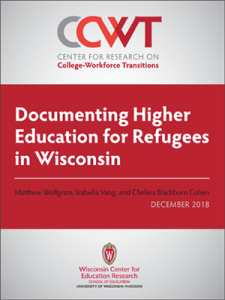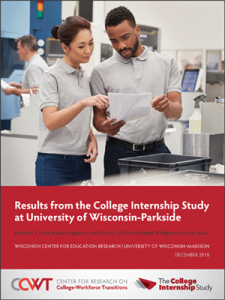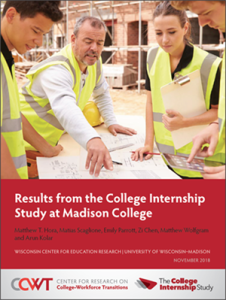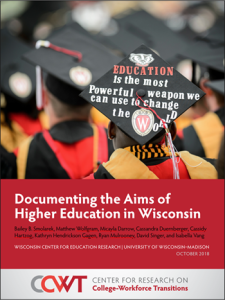Filter by Category:
Search
Year
- Category: Research Reports
- Clear Filters
 Matthew Wolfgram, Isabella Vang, and Chelsea Blackburn Cohen (2018). Documenting Higher Education for Refugees in Wisconsin.
Matthew Wolfgram, Isabella Vang, and Chelsea Blackburn Cohen (2018). Documenting Higher Education for Refugees in Wisconsin.
Abstract: This report presents preliminary findings from a study documenting the obstacles and pathways to higher education for refugees in Wisconsin. The study is based on interviews and observations with refugee resettlement service providers and educators who support the college goals and attainment of refugees.
The findings indicate:
- policy goals and constraints that complicate and obstruct efforts to support higher education for refugees, and
- obstacles and networks that present barriers to refugees in accessing and succeeding in higher education.
We discuss how resettlement services providers access various social networks to support refugees in overcoming such obstacles. The report concludes with a discussion of practical implications and future research directions to support higher education for refugees.
 Matthew T. Hora, Matias Scaglione, Emily Parrott, Zi Chen, Matthew Wolfgram and Arun Kolar (2018). Results from the College Internship Study at University of Wisconsin-Parkside.
Matthew T. Hora, Matias Scaglione, Emily Parrott, Zi Chen, Matthew Wolfgram and Arun Kolar (2018). Results from the College Internship Study at University of Wisconsin-Parkside.
Abstract: This report includes preliminary findings from the first round of data collection for The College Internship Study, which is a mixed-methods longitudinal study of internship programs at University of Wisconsin-Parkside.
The study includes an online survey of students with junior standing or above (n=525), focus groups with students who have and who have not had an internship experience (n=25), and interviews with career advisors and faculty (n=6), and with one area employer involved in internship program administration. The research questions guiding this study focus on how stakeholders conceptualize the idea of internships, participation rates by certain demographic characteristics, and the relationship between internship program structure and student outcomes.
This report concludes with recommendations for specific steps that students, faculty and staff at UW-Parkside, and employers can take to increase participation rates, access, and program quality for internship programs in southeastern Wisconsin.
 Matthew T. Hora, Matias Scaglione, Emily Parrott, Zi Chen, Matthew Wolfgram and Arun Kolar (2018). Results from the College Internship Study at Madison College.
Matthew T. Hora, Matias Scaglione, Emily Parrott, Zi Chen, Matthew Wolfgram and Arun Kolar (2018). Results from the College Internship Study at Madison College.
Abstract: This report includes preliminary findings from the first round of data collection for The College Internship Study, which is a mixed-methods longitudinal study of internship programs at Madison College.
The study includes an online survey of students in the second half of their academic programs (n=395), focus groups with students who have and who have not had an internship experience (n=14), and interviews with career advisors and faculty (n=12), and area employers (n=18) involved in internship program administration. The research questions guiding this study focus on how stakeholders conceptualize the idea of internships, participation rates by certain demographic characteristics, and the relationship between internship program structure and student outcomes.
This report concludes with recommendations for specific steps that students, faculty and staff at Madison College, employers and policymakers can take to increase participation rates, access, and program quality for internship programs in the Madison area.
 Bailey B. Smolarek, Matthew Wolfgram, Micayla Darrow, Cassandra Duernberger, Cassidy Hartzog, Kathryn Hendrickson Gagen, Ryan Mulrooney, David Singer, and Isabella Vang (2018). Documenting the Aims of Higher Education in Wisconsin.
Bailey B. Smolarek, Matthew Wolfgram, Micayla Darrow, Cassandra Duernberger, Cassidy Hartzog, Kathryn Hendrickson Gagen, Ryan Mulrooney, David Singer, and Isabella Vang (2018). Documenting the Aims of Higher Education in Wisconsin.
Summary: This report presents a community-based participatory action research project conducted by a group of University of Wisconsin–Madison undergraduate students to document how Wisconsin residents view the aims of higher education in the state. While questions regarding the purposes of higher education have long been debated, recent reforms in Wisconsin regarding higher education funding, governance, and objectives have brought new attention to these issues. Namely, there is an increased emphasis among Wisconsin’s elected officials to restructure the state’s public higher education system to be more tightly aligned with business interests. These reforms have garnered considerable outcry from those who oppose them, which has contributed to the state’s deep political polarization. In the midst of this context, our research team developed a qualitative research study to better understand how Wisconsin residents currently view the aims of higher education, which we conceptualized as any schooling past high school. Our research team is unique in that the people arguably most affected by higher education policy—students—are the researchers. We contend that this model offers promising avenues for higher education policy research because of its capacity to include perspectives that are often excluded. After conducting in-depth interviews with a diverse sample of Wisconsin residents (N=40), our research team found that participants discussed an eclectic variety of aims rather than only one aim for higher education. The aims most commonly discussed included economic development and employment, civic and community engagement, social mobility, personal growth and enrichment, and critical thinking and interpersonal skills. Additionally, participants discussed concerns regarding obstacles that impede access to and achievement in higher education, such as affordability and institutional supports. Our study indicates that Wisconsin residents do not want higher education to be focused on a single aim. Rather, it demonstrates the need to value the multiple aims higher education serves and support higher education students.
